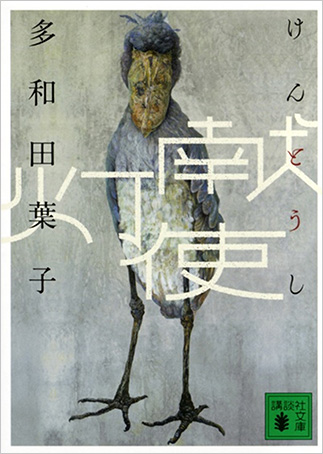
FICTION
Kentōshi
[trans. The Emissary]
Kōdansha (Kōdansha Bunko), 2017. 272 pp. ¥650. ISBN 978-4-06-293728-3.
Also published in: Chinese (traditional and simplified characters), Czech, Dutch, English, German, Romanian, Thai, and Turkish
The story takes place in a hypothetical Japan that has suffered irreparably from a catastrophic disaster. Japan cuts itself off from the world and severs diplomatic ties with other nations. The government is privatized, and politicians are reduced to spending their time on futile revisions of the laws. The nation’s children are enfeebled, constantly running temperatures and barely able to stand or walk. The only ones left with any get-up-and-go are the elderly. In this way, the novel presents an incisive reflection on today’s Japan, still reeling from the effects of the March 11, 2011, triple disaster and struggling to come to terms with the declining birthrate and the aging society. Surprisingly, however, the novel is a delight to read, and is filled with an irrepressible humor. All the conditions are in place for a dystopian novel, but the supple and playful way in which the story is told seems to deftly repel “the curse.”
At the center of the story is a youth known as “Nameless.” He is powerless, but his life offers a beacon of hope. He is not a prisoner of the past and is not prey to self-pity or pessimism. This boy, whose voice does not change with age, who does not grow into an adult, his hair white in spite of his youth, waits for the time when he will cross the sea and set off for the unknown, forbidden world beyond.
The author depicts an era in which people have started to doubt the faith that supported Japan’s modernization. Through the image of this mysterious yet strangely attractive boy, the novel gives readers a glimpse of “the beauty of the time that is yet to come.” (NK)
At the center of the story is a youth known as “Nameless.” He is powerless, but his life offers a beacon of hope. He is not a prisoner of the past and is not prey to self-pity or pessimism. This boy, whose voice does not change with age, who does not grow into an adult, his hair white in spite of his youth, waits for the time when he will cross the sea and set off for the unknown, forbidden world beyond.
The author depicts an era in which people have started to doubt the faith that supported Japan’s modernization. Through the image of this mysterious yet strangely attractive boy, the novel gives readers a glimpse of “the beauty of the time that is yet to come.” (NK)

Translation rights inquiries
Kōdansha Ltd.
(attn. Kitaoka Morio, International Rights Dept.)
2-12-21 Otowa, Bunkyō-ku, Tokyo
112-8001
Tel.: +81-3-5395-4112
Fax: +81-3-3942-7204
Email: m-kitaoka@kodansha.co.jp
(When sending an e-mail, please enter a half-width character "@" instead of a full-width character "@.")

